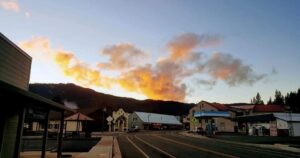Dixie Fire Claims Attorney
Dixie Fire Claims
PG&E says it’s “probable” it will have to pay
PG&E is supposed to keep trees trimmed at least four feet from its electrical lines. But it left a Douglas fir tree growing too close to its 12kV powerline at Bucks Creek. As a result, the tree leaned up against PG&E’s wires and started the Dixie Fire.
When a utility fails to comply with its tree trimming obligations, and as a result its electrical lines start a fire, the utility has to pay for the resulting damage.
We Can Help Because We’ve Done It Before

Holding PG&E accountable is what we do. We sued PG&E on behalf of the survivors of the Camp Fire, the North Bay Fires, the Butte Fire, the Kincade Fire, and more. And we’ve won. At this point, we know more about PG&E’s internal policies and how they place profits over safety than even PG&E’s own management. And our track record against PG&E is very close to 100 percent.
Contact us to discuss what your claim against PG&E for the Dixie Fire might look like and how you can be made whole for your loss. There’s no cost and no obligation.
Frequently Asked Questions:
Q: PG&E went bankrupt. Does it have money to pay Dixie Fire survivors?
A: Yes. PG&E is now out of bankruptcy. It’s in good financial condition and is making a profit. PG&E reports that it has $300 million in private insurance coverage for the Dixie Fire. If that’s not enough, PG&E has access to a $21 billion state-sponsored insurance fund. PG&E has the ability to pay.
Q: The Dixie Fire is huge. Won’t PG&E just file bankruptcy again?
A: That’s unlikely. The whole purpose of the state-sponsored $21 billion insurance fund is to keep PG&E financially sound despite claims from fires like the Dixie Fire.
Q: How long will it take for Dixie Claimants to get any money?
A: In most of the cases we handled against PG&E before its bankruptcy, we had checks in our clients’ hands within 3 years from the date of the fire.
Q: Is this a class action?
A: No. In a class action, you are automatically involved unless you opt out. A wildfire is a “mass tort.” That means each person’s claim counts as an individual case. You need to hire a lawyer to be represented. If you win, you will be compensated according to your individual losses.
Q: Where will the claims be heard?
A: Most likely San Francisco, because that’s where PG&E is headquartered. We know the San Francisco judges well because San Francisco is one of our “home courts.”
Q: I have insurance. Is it worth making a claim against PG&E?
A: In most cases, yes. Even the best insurance doesn’t cover all wildfire losses. Few policies, for example, cover the full costs of rebuilding. They don’t cover the costs of replacing trees. And they don’t pay more than market value of sentimental items like high school yearbooks, family heirlooms, and children’s artwork.
Harm to Properties Affected by Dixie Fire Likely to Get Worse Before It Gets Better:
Unfortunately, after a wildfire like the Dixie Fire things typically get worse for the affected properties rather than better. As winter rolls in:
- Trees that survived the fire end up getting cut down by errant PG&E crews
- Dead trees and tree limbs begin to fall, making properties “off-limits” due to the hazard
- Water runoff causes erosion issues, subsidence, and landslides
- Fences and structures lose their footing
- Gravel roads are damaged by heavy equipment entering properties to remove trees
- Invasive weeds take hold and propagate
- Silt fills streams and kills fish and, in some cases, livestock
- Pests, rodents, and destructive insects infiltrate
“The settlement results Mike and his team achieved far exceeded our expectations. If you are thinking about hiring this firm, run, do not walk. You will be in excellent hands.”
-Marilyn S., Fire Client

